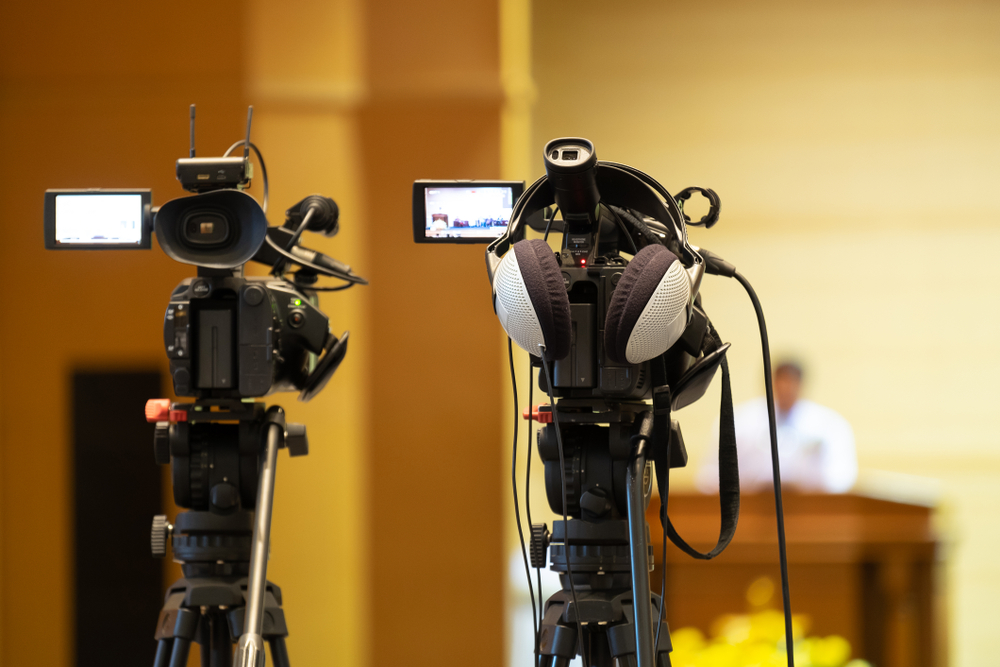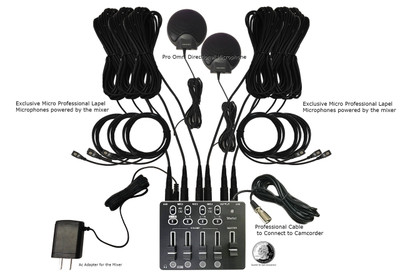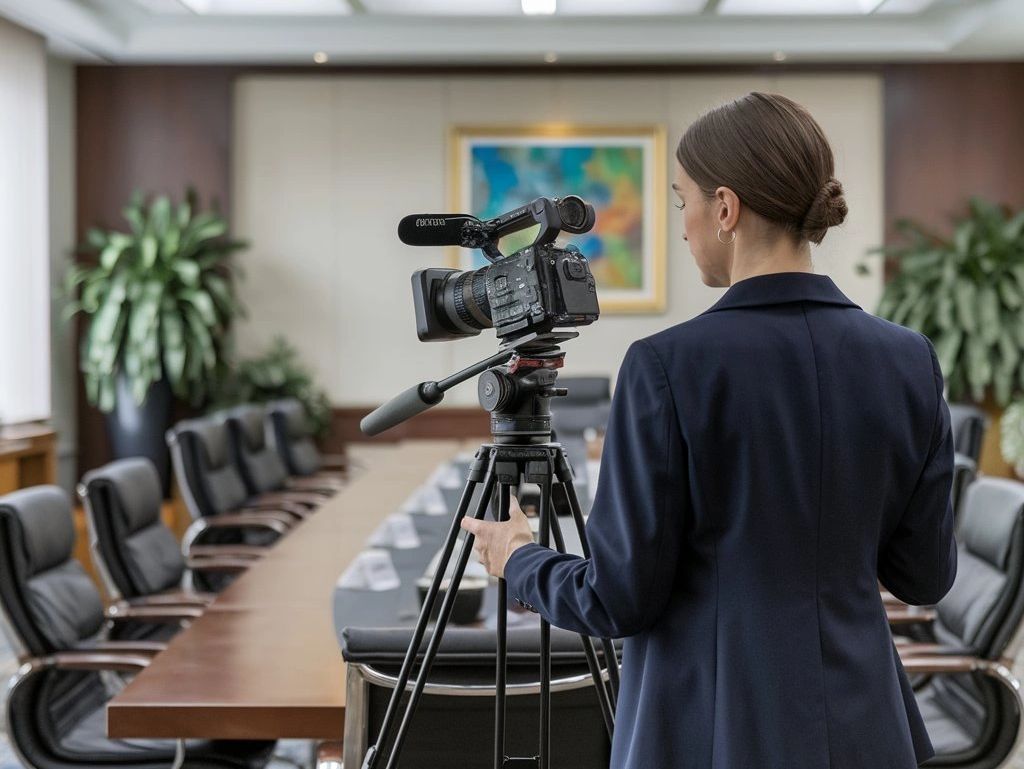The Relevance of Legal Video Clip Depositions in Modern Legal Solutions: What You Should Know
Lawful video clip depositions have actually ended up being necessary in today's legal landscape. They provide a multidimensional sight of witness statements that traditional transcripts merely can not match. By catching both non-verbal and spoken communication, these depositions enhance the total understanding of a witness's integrity. However, the performance of video depositions pivots on different elements, consisting of compliance with lawful requirements and ideal techniques (legal video depositions). Checking out these aspects discloses their true value in modern legal services
What Are Legal Video Clip Depositions?
Lawful video depositions function as a vital tool in the lawsuits process. They include videotaping witness testimonies in a video clip layout, capturing both non-verbal and verbal interaction. This approach allows attorneys to record the demeanor, expressions, and reactions of witnesses, supplying a richer context for the testament. Typically carried out in a regulated setting, these depositions are led by lawyers that ask inquiries while a stenotype reporter records the dialogue. The resulting video can be vital for trial preparation, as it enables attorneys to analyze the reliability of witnesses and fine-tune their methods. In addition, lawful video depositions can be utilized in various legal contexts, varying from civil disagreements to criminal cases. The visual and auditory aspects of video clip depositions improve the presentation of evidence, making it a vital element in the contemporary lawful landscape. Overall, they contribute significantly to the effectiveness and effectiveness of lawful process.

Advantages of Video Depositions Over Conventional Methods
Video clip depositions supply countless advantages compared to traditional methods of taking witness testimonies. One significant advantage is the capacity to record both audio and aesthetic aspects, supplying a much more complete record of the witness's declarations. This dual layout enhances clearness and permits lawyers to reference details nuances during trial preparation. Additionally, video clip depositions facilitate remote involvement, making it less complicated for witnesses who may be not available for in-person looks because of geographical restrictions or health issues.Moreover, video clip depositions can speed up the total deposition process, minimizing the moment and expenses connected with traveling and logistics. They likewise boost access, as taped depositions can be easily shared amongst legal groups and referenced at any moment. This convenience adds to better situation management and prep work. In general, video clip depositions represent a modern-day, efficient technique to gathering witness testaments, aligning with the developing needs of the lawful occupation.
The Role of Body Movement and Tone in Testimonies

In lawful video clip depositions, body movement and tone play important functions in sharing a witness's trustworthiness and dependability. Nonverbal cues can offer understandings right into a witness's psychological state, influencing exactly how their statement is regarded. Recognizing the impact of these elements is vital for jurors and lawyers alike when evaluating the reliability of a testimony.
Nonverbal Communication Insights
While verbal communication is typically stressed in lawful statements, nonverbal hints such as body movement and tone play a crucial role in conveying reliability and emotion. Onlookers of depositions might keep in mind that a witness's pose, motions, and faces can considerably influence understandings of dependability. Consistent eye contact may signal confidence, while staying clear of stare can suggest dishonesty or discomfort. In a similar way, the intonation-- its pitch, quantity, and rate-- can pass on feelings of sincerity or uncertainty. Lawyers should be in harmony with these nonverbal signals, as they often supply vital context that complements spoken words. Understanding these nuances can enhance the performance of depositions and influence the end result of legal procedures.
Psychological Tone Influence
The emotional tone conveyed during legal testaments substantially impacts exactly how a witness is viewed. Body movement, vocal inflections, and facial expressions play crucial roles in shaping the story of a testimony. A witness exhibiting confidence through steady eye contact and a calm tone can instill a sense of dependability and interaction. On the other hand, indications of anxiety, such as fidgeting or an unstable voice, may bring about skepticism concerning their account. The subtleties of psychological expression can affect the interpretation of facts, making it vital for attorneys to identify these signs. In video clip depositions, the auditory and aesthetic parts incorporate, stressing the relevance of psychological tone in conveying sincerity and reliability within the legal procedure.
Integrity and Reliability
A crucial factor in establishing credibility and dependability throughout statements exists in the witness's body language and tone of voice. Observers frequently count on non-verbal signs-- such as eye get in touch with, posture, and motions-- to examine a witness's sincerity. As an example, a witness who preserves eye get in touch with and presents open body movement may be viewed as even more trustworthy and sincere than one who stays clear of eye call or appears shut off. Furthermore, tone of voice plays a vital role; a steady, tranquil tone can enhance the reliability of the testimony, while variations in pitch or volume might increase questions. Ultimately, the combination of body movement and singing tone greatly affects exactly how a witness's declarations are obtained and translated in a legal context.
Best Practices for Performing Video Depositions
Conducting video clip depositions needs cautious planning and execution to assure a effective and clear discussion of statement. It is essential to pick my review here a peaceful, well-lit area to reduce disturbances and safe and secure ideal video clip quality. The tools ought to be examined in development, including cams, microphones, and lighting, to avoid technical concerns during the deposition.Next, celebrations entailed should assess the format and treatments ahead of time, seeing to it that every person understands their functions. The deponent needs to be briefed on the process, consisting of how to respond plainly and concisely.Additionally, keeping a professional temperament throughout the session is necessary. This consists of refraining from speaking over each other and validating that all inquiries are guided properly. Finally, it is important to tape-record the deposition in a style that permits very easy playback and testimonial, maintaining the integrity of the testament for future usage.
Legal Factors To Consider and Conformity Issues
Just how do lawful factors to consider and conformity issues impact the efficiency of video depositions? Lawyers must navigate a complicated landscape of laws, ensuring that video depositions comply with jurisdictional rules and standards. Conformity with regulations worrying personal privacy, consent, and tape-recording methods is important. Getting specific approval from all parties involved is essential to stay clear of legal repercussions.Additionally, the admissibility of video proof in court can hinge on compliance with step-by-step demands. Guaranteeing that the equipment made use of satisfies technical criteria is likewise important, as low quality can undermine the deposition's reliability.Moreover, lawyers need to recognize any kind of certain state laws that govern video clip depositions, as these can vary substantially. Failure to resolve these factors to consider can not only threaten the integrity of the deposition yet likewise influence the general case method, ultimately influencing the client's lawful outcomes.
How Video Clip Depositions Effect Court Perception
While video clip depositions can function as powerful tools in lawful procedures, their impact on jury assumption is significant. The acoustic and visual aspects of video clip recordings offer jurors with an extra complete understanding of witness temperament, reputation, and emotional actions. This multimedia strategy can enhance the jurors' capacity to assess the dependability of testament compared to conventional text-based transcripts.Moreover, video clip depositions enable jurors to observe body movement, intonation, and face expressions, all of which can affect their analysis of the witness's statements. The existence of a witness on display can humanize them, fostering compassion and link, which may sway jurors' viewpoints. Alternatively, a witness who appears untrustworthy or evasive on video clip may result in negative understandings that influence a court's choice. Inevitably, the vibrant nature of video depositions plays a crucial duty fit how jurors interpret evidence and reach their verdicts.
The Future of Video Depositions in Legal Practice
As improvements in innovation proceed to improve the lawful landscape, the future of video depositions is poised for considerable development. Advancements such as expert system, online truth, and improved video conferencing tools are anticipated to simplify the deposition procedure and boost access. Attorneys may utilize AI-driven analytics to assess witness trustworthiness and situation strength more effectively.Moreover, the integration of virtual fact can enable juries to experience immersive simulations of depositions, offering deeper context and understanding. In addition, the fad toward remote depositions is likely to linger, supplying better versatility for attorneys and customers alike.As remote job comes to be progressively normalized, video clip depositions will likely end up being basic practice, lowering expenses and time constraints connected with conventional methods. On the whole, these technological advancements assure to enhance the performance, efficiency, and accessibility of video clip depositions in legal method, ultimately changing how attorneys plan for trial.
Regularly Asked Concerns
Just How Much Do Legal Video Clip Depositions Generally Price?

Can Video Depositions Be Made Use Of in Any Kind of Case?
Video clip depositions can be utilized in different kinds of situations, consisting of civil, criminal, and family legislation. Their adaptability enables lawyers to present witness statements successfully, adjusting to the particular requirements of various lawful situations.
What Devices Is Required for a Video Deposition?
To conduct a video deposition, necessary equipment includes a premium electronic camera, microphone, lighting, and a trustworthy recording tool. Additionally, a computer with modifying software program might be necessary for post-production and formatting the final video.
How much time Does a Typical Video Deposition Last?
A common video deposition lasts between 2 to 4 hours, relying on the intricacy of the case and the number of concerns presented. Extensive sessions might happen, however breaks are normally integrated for individual comfort.

Are Video Clip Depositions Admissible in Court?
Video clip depositions are typically read what he said permissible in court, offered they stick to legal standards and rules of evidence. Their usage boosts quality and maintains witness statement, helping in the judicial process during trials and hearings. Lawful video clip depositions have ended up being vital in today's legal landscape. Additionally, lawful video clip depositions can be utilized in various lawful contexts, varying from civil conflicts to criminal situations. Additionally, video clip depositions promote remote involvement, why not look here making it much easier for witnesses who might be inaccessible for in-person appearances due to geographical constraints or health issues.Moreover, video clip depositions can speed up the overall deposition process, minimizing the time and prices linked with traveling and logistics. Ensuring that the tools utilized meets technological requirements is also vital, as bad quality can threaten the deposition's reliability.Moreover, attorneys must be mindful of any kind of specific state regulations that govern video clip depositions, as these can vary substantially. Furthermore, the fad toward remote depositions is most likely to continue, offering higher flexibility for lawyers and customers alike.As remote work comes to be progressively stabilized, video depositions will likely end up being basic technique, reducing expenses and time constraints associated with conventional methods.